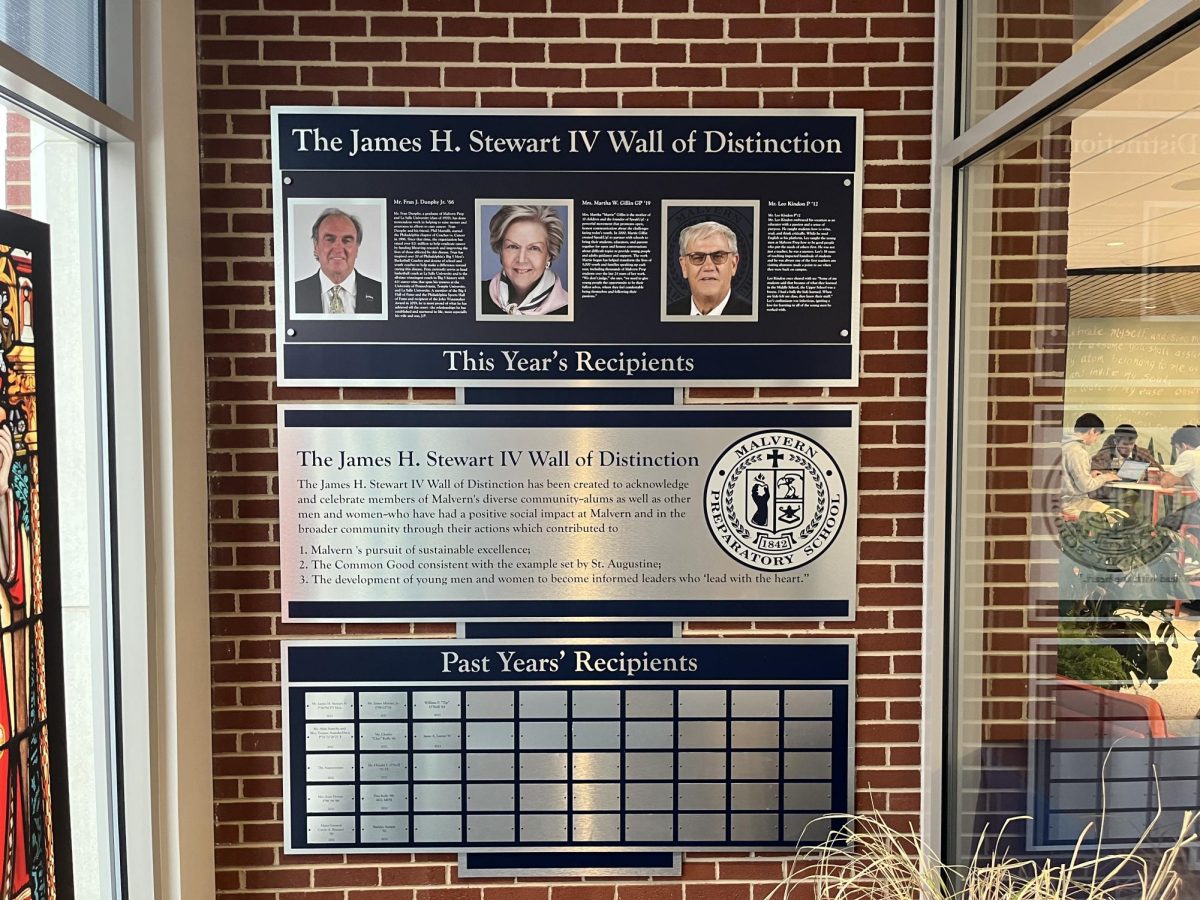Changes to the May schedule and the finals schedule offer a preview of what Friars can expect next year and in the future

In previous years, May was always a treasured month to students at Malvern. This month was an item of suspense and wonder, with freshmen pondering how true the phrase “high school flies by” is, sophomores breaking out their hundred page Honors U.S. History Study I Guide, and juniors stocking up on Aleve and tissues for after their “two hour” Roper final. Seniors would finish up their finals in May, and be astonished one how in less than a month, they would no longer be able to walk through the campus as a member of the student body. This was the way May went.
Yet this school year, with 8+ snow days behind and a reinvented schedule ahead, the administration has to turn to more drastic measures. In order to finish this school year and prepare for the next, changes in the May exam structure and schedule promise an eventful and controversial end to the school year.
If you have not already heard, you will not be sitting down in O’Neill this June for two hours taking your Marine Biology exam, or your Honors Spanish III exam, or your Early Civilizations exam. In fact, the only two subjects in which you will having a “traditional” exam are Mathematics and Theology. Let’s refer to this particular type of exam as a TE (ˈtē). At first, a student may be shouting with glee out of the two nights of cramming, as opposed to the usual five nights of cramming. “Now, I know that by only having two TE’s, we’re making up class time, but does that mean I don’t have a final in my other three subjects?”
Enter 21st century education.
The answer to your question, students, is that you will have a final in science, english, history, etc., but it will be in a modified exam format. Again, for the purpose of saving paper, we’ll refer to this as a ME (ˈmē). “What is this format?” you may ask, and the answer to this question is set in stone: It depends.
For chemistry, a ME will be as simple as by making the requirements for the “Unknown Lab” more demanding. For the other subjects; however, figuring out the format of the ME may be more difficult. It could be anything, from writing a five page paper on the history of the Cro-magnon people, to building an aerodynamic flux capacitor capable of world domination. This is what students tend to feel is most unsettling about the change – the fact that neither they nor even the teachers seem to know how well a ME will work, or even what they’ll have to do for a ME.
A lot of the teachers I talked to have embraced the idea of a ME. The science department seemed to think the change was a good idea – with some reservation. “The problem,” said Mr. Boyce, “is not that we have to change to or even think of a different format for the test; it’s that we have to assure the parents that with these changes, their child will still be best prepared for the exam formats their child will face in college.”
“‘Adjust Accordingly’ is the directive in numerous ‘How to do’ fix-it manuals, and is a good fit here,” said Mr. Ostick, renowned Economics teacher. “The benefits of using the ‘exam days’ to pick up class work missed seems like an effective choice.”
Some students are also embracing the changes. “I do like the modified finals at the end of the year because it relieves a ton of stress and hours spent studying for these difficult finals,” said Cole Thomas ‘16. “It gives the students the best possible chance to do well on 20% of their final grade.”
Other members of the faculty and student body; however, are not taking too kindly to the ME’s. Some teachers, who wished to stay anonymous, are saying that doing away with the two hour exams is a bad decision. Most of the arguments against this were that students need to practice the skill of focusing for an extended length of time, and need to learn how to summarize their learning for a semester or longer. Several of the opposers noted that most colleges and universities do and will require sit-down, fairly extended, written, summative assessments at the end of the course.
Students and faculty have many questions about how MEs will work. “I’m giving my 6th and 7th grade U.S. History students ‘final exam’ projects which are due prior to June 27th,” said Mr. Chinici. “They have several choices of formats to select from and are permitted to work alone or as a two-man team. I’m not sure yet how it will all work out but the proof of the pudding is in the tasting.”
“Who knows?” Chinici added. “This may be the wave of the future here at Malvern.”
May also holds another surprise in store for us.
Every efficient system has gone through a testing phase at one point. In May, one of the most controversial changes at Malvern is going through its testing phase, and is receiving both backlash and support. This is none other than the infamous block scheduling.

For ten calendar days in May, Malvern will be trying out the proposed “modified block schedule” to both see if it will work and to give the teachers and students a slight taste of next year’s schedule.
One of the big worries from the faculty is that too many changes are happening too fast, and the end of the year will be nightmarish with the combination of the modified block and the stress of the fourth quarter.
Students are being most vocal about this. “I believe that we should not be following the example of Haverford,” says Bennett. (The Haverford School has six block-style periods in each school day.) “We should establish ourselves academically through the recruitment of more intelligent students; not through being guinea pigs of a 21st century learning idea.”
“The way this test run is being enacted in practice, seems to me like the administration is pulling a stunt,” said Alex Yablonski ‘15. “At the end of this they can claim to have done their due diligence, when in fact their minds are already made up, and almost nothing will stop their choice to switch to the block.”
“I’ve heard that there were experts that claimed there are studies to support their findings that block works,” continued Yablonski. “But the presentations where staged at times apart from when the student body is collected, and only 2 students were invited to sit in.”
“I sure hope we like it, because if we don’t, it won’t matter to anyone with the will or power to make it change.”
The general consensus of current students seems to be that block scheduling is not something which they wish to have part of their Malvern experience. What do recent alumni think? Opinions were generally favorable towards the addition of the blocked scheduling; however, they did offer some suggestions of how to improve the schedule.
Alex Tran, ‘13 (Northeastern ‘17) said, “I think that block scheduling is a good idea to get students used to longer classes which they will ultimately face in college.” However, Tran noted, “I do not feel that everybody should partake in this. In my own personal opinion, I believe that blocked scheduling should only apply to the juniors and seniors, being that they will need to be more prepared for this college-like class. The underclassmen, I feel, should stay with the schedule that Malvern uses today, because blocked scheduling may seem intimidating for the newly formed members of the Malvern community.”
Nick Anderson, ‘13 (Brown University ‘16), also gave an insight on block scheduling: “Even though I prefer shorter classes, I see the benefits which block schedules can have for classes like lab sciences. Also, larger class sections will offer an experience closer to that of college. It may also offer chances to dig deeper into material, for example, doing a thematic analysis of literature rather than simple plot review.”
Would Anderson have wanted block scheduling when he was a student at Malvern? “I am happy with my Malvern experience. I do not think block scheduling would compromise the Malvern experience enough to spark a controversy. I see value in both scheduling methods and am indifferent between the two.”
Malvern has shown this year that it is changing, and we will see two of the changes this May. MAYbe all of these changes will bring Malvern to a level of greatness which no school has ever achieved before. MAYbe the road will not always be smooth. But MAYbe, just MAYbe, we are all overthinking this, and stressing too much about something that we will we be able to understand it in full after we have experienced it.
Nobody can say for certain how these changes will affect Malvern as a whole, but as Matt Hoban, ‘12, (Drexel University ‘16) says, “I think it’s worth a shot!” For better or worse, MAY the change be with you, Malvern, as we SPRING into the 21st Century.
Learn more at the Malvern Virtual Town Hall page.















